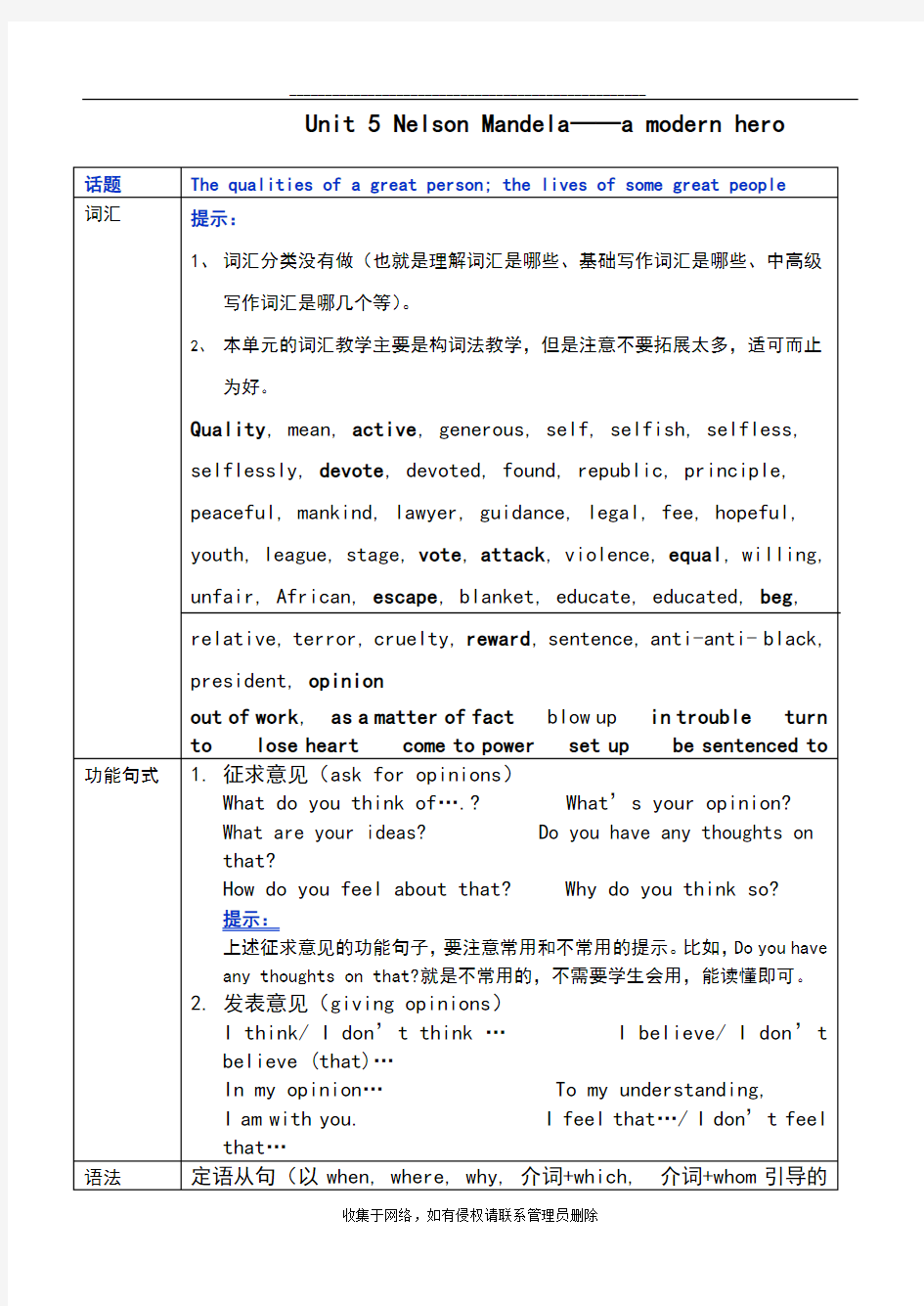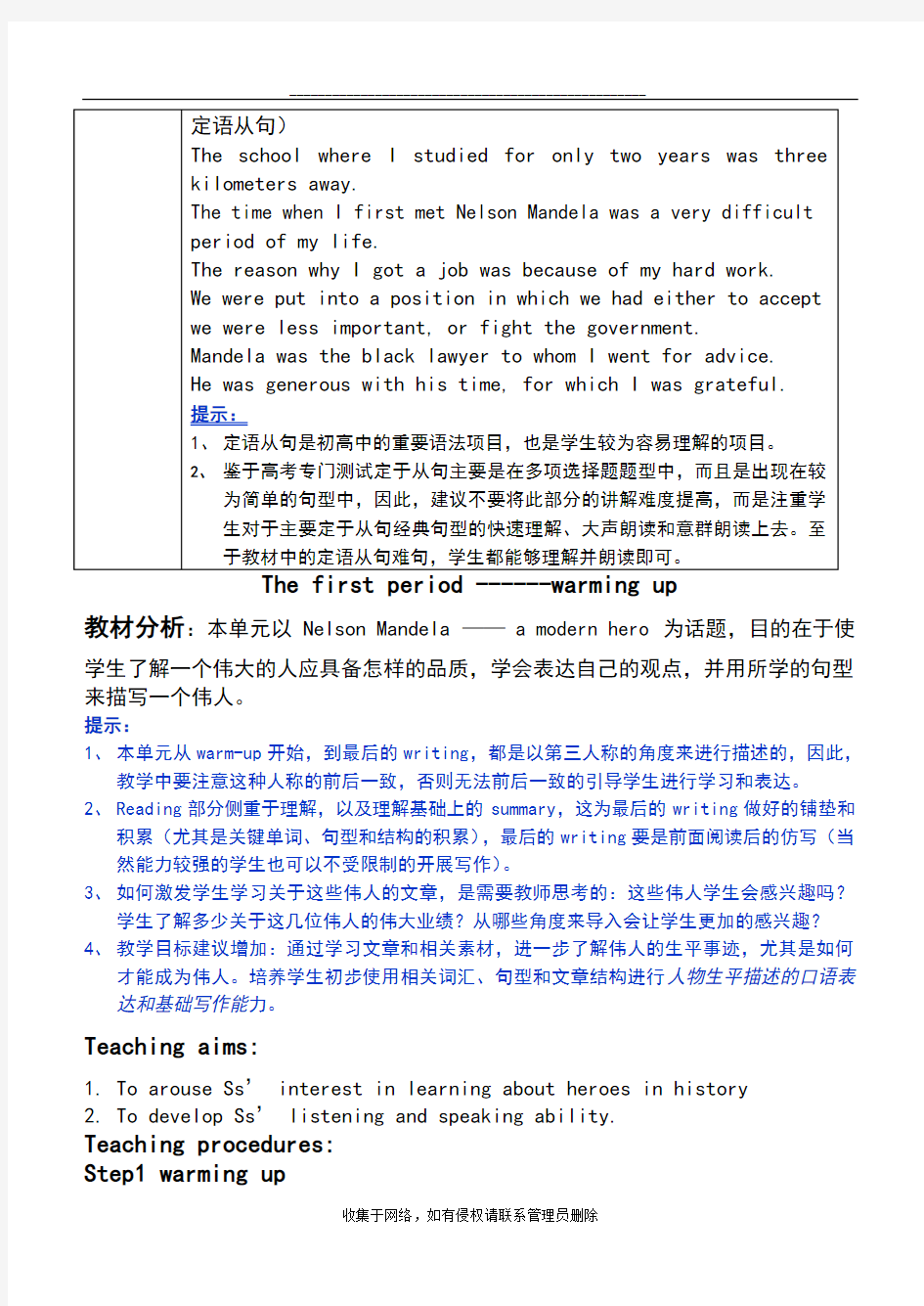

Unit 5 Nelson Mandela——a modern hero
教材分析:本单元以 Nelson Mandela —— a modern hero 为话题,目的在于使
学生了解一个伟大的人应具备怎样的品质,学会表达自己的观点,并用所学的句型来描写一个伟人。
提示:
1、本单元从warm-up开始,到最后的writing,都是以第三人称的角度来进行描述的,因此,
教学中要注意这种人称的前后一致,否则无法前后一致的引导学生进行学习和表达。
2、Reading部分侧重于理解,以及理解基础上的summary,这为最后的writing做好的铺垫和
积累(尤其是关键单词、句型和结构的积累),最后的writing要是前面阅读后的仿写(当然能力较强的学生也可以不受限制的开展写作)。
3、如何激发学生学习关于这些伟人的文章,是需要教师思考的:这些伟人学生会感兴趣吗?
学生了解多少关于这几位伟人的伟大业绩?从哪些角度来导入会让学生更加的感兴趣?4、教学目标建议增加:通过学习文章和相关素材,进一步了解伟人的生平事迹,尤其是如何
才能成为伟人。培养学生初步使用相关词汇、句型和文章结构进行人物生平描述的口语表达和基础写作能力。
Teaching aims:
1. To arouse Ss’ interest in learning about heroes in history
2. To develop Ss’ listening and speaking ability.
Teaching procedures:
Step1 warming up
●Describe yourselves
First what kind of person are you? (shy, outgoing, fun, mean, immature, nice, kind, honest, brave, loyal, happy, wise, smart, friendly, warm, cheerful, popular, generous, hard-working, diligent, weak, stupid, lazy, dishonest, tense, cold, unkind, miserable, dull, strong-minded, determined etc.)
●Discussion (Encourage students to give five or six qualities that they
think great persons have, and give their reasons.)提示:What kind of great persons? Politicians, scientists, or? Different kinds of great persons, different qualities.
Question 1: Who do you think are the greatest men in your mind? Can you name some?
Question 2: In what way do you consider a man is a great? What is your standard?
●Look at page 33 and then ask the Ss if these famous people are great
people.
●Conclusion:
A great person is a person who has followed his or her ideas and sacrificed(牺牲) something so that they could be realized. A pop singer may be very popular with the young people, but he/she is not a great man/woman.
A famous person may be well-known but if he or she has not gone through struggles and difficulties for their noble aims, they can not be called a great person.
Step2 language points:
1. devote vt
oneself to 献身于、致力于。。。
devote one’s life/one’s time to….把生命、时间献给。。。
…to …把。。。用于。。。
E.g. He devoted his life to promoting world peace.
He devoted his life to the promotion of world peace.
devoted adj 忠实的, 深爱的
be devoted to 对…忠实, 对…深爱
a devoted friend
She is devoted to her husband.
即学即练
The manager devotes all his spare time ______ the violin. B A. to practise B. to practising C. in practising D.
for practising
2. fight for 为……而战
fight against 与……作斗争;与…作战
fight with 同
…并肩作战; 与…作战
E.g. We will have to fight against difficulties.
I
’ll fight with you, in other words, I’ll support you.
Slaves were fighting for freedom.
3. give up 表示主动放弃或屈服
e.g. He has decided to give up smoking.
give in 表示被动屈服或认输,
后面不带宾语。如果接宾语用give in to e.g. You can’t win the game, so you may as well give in.
The second period-----extensive reading
Teaching aims:
1) To have Ss learn about some information about Nelson Mandela and the situation where the black was badly or unfairly treated.
2) To get Ss to learn about reason why Nelson Mandela helped the black people to get the same right as white people.
Teaching procedures:
Step1 make prediction:
Read the title of the text and guess what kind of writing the text is. (Narrative writing)
Step2 scanning: read the text quickly and then decide how many parts this text can be divided into and then give the main ideas of each part. Part 1(Para. 1---2) The life of Elias’ before he met Nelson Mandela Part 2(Para.3---5) The change of Alias life after he met Nelson Mandela and what Mandela did.
Step 3 skimming:
Scan the test specific information to finish comprehending part.
Step 4
Let’s go over the text once more to make a diagram of it with key words
Homework
1. Go over the “Reading ” and find out the useful expressions in it.
The third period----intensive reading
Language points:
1. The time when I first met Nelson Mandela was a very difficult period of
my life.
when 在句子中引导的是时间定语从句。when 指时间,在定语从句中做时间状语:
e.g. I still remember the day when I first came to the school.
The time when we got together finally came.
2. It was in 1952 and Mandela was the black lawyer to whom I went for advice. advice n. a piece of advice 一条建议 ask for advice 征求意见
give sb. advice on …关于…给某人建议
advise v.
1) advise sb. on/ about sth. 就……给某人出主意
e.g. I have advised you on that subject.
2) advise sb. to do sth. 建议某人干……
e.g. Our monitor advises me to practice more spoken English.
3)advise doing sth 建议做某事
e.g. I advise waiting until tomorrow.
4) advise that + (should) do
e.g. I advise that you (should) not eat fruit that isn ’t ripe.
即学即练I ____ my father to give up smoking, but he didn ’t think it was necessary. A
A. advised
B. hoped
C. persuaded
D. suggested
提示:
这种“即学即练”对于学生来说能锻炼什么呢?我觉得还是练习阅读理解的,不是练习词义选
择的。另外,这部分刚刚讲解的advice ,学生从最普通的逻辑推理也会知道此练习题是要训练
advice 的。再者,从词义和语境的搭配角度来看,hoped 、persuaded 和suggested 都可以的,
只是语法不对而已,这种单纯的考查词汇搭配记忆的题目,在目前的高考试题中,以及将来的
高考试题中,都已经和应该被抛弃的。
3. …and I worried about whether I would become out of work.
out of work 失业 (做表语或后置定语)
e.g. Jim has been out of work for months.
The number of people out of work reached 300.
Out of …常有“出于,由于,缺乏,没有;放弃,丧失;越出。。。之外”等意
义。
即学即练
At the railway station, the mother waved goodbye to her daughter until the
train was . (08高考) A
A. out of sight
B. out of reach
C. out of order
D. out of place
提示:
个人觉得这种给出高考真题的练习题的方式不是最好,建议给出更多的几句例句,通过学生阅
读理解句子的方式来锻炼理解短语在新语境中意思的能力。
4. The last thirty years have seen the greatest number of laws stopping our
rights and progress, until today we have reached a stage where we have almost
no rights at all.
see 在此句意为“见证, 目睹”; (在某段时期)发生(某情况), 经历, 经受; 英
语中有些动词的主语有时不是人,而是物,而且经常是表时间和地点的名词。这是
一种拟人的用法,可以使句子显得生动有趣。
e.g. The last few months has seen more and more traffic accidents.
The city has seen many changes.
5. We were put in a position in which we had either to accept we were less important, or fight the government.
accept “接受”, 指的是主观上接受了
receive “收到”, 指客观收到但不一定接受
提示:
上面的这个总结,应该是帮助学生通过理解不同的句子后自己总结的,而不该直接给出。
e.g. I accepted his invitation to the party.
译:我收到了他的邀请, 但我没有接受。I received his invitation, but I didn't accept.
6.…only then did we decide to answer violence with violence. only then 此处引起倒装句, 当only修饰状语位于句首时, 句子采用部分倒装的
结构。
e.g. Only by practicing a few hours every day will you be able to master English.
Only then did I realize that I was wrong.
Only in this way can you solve the problem.
Only when he came back did we know the secret.
You can leave only when he comes. = ______ ______ he comes _____ you
leave.(Only when can)
注意1: 如果only所强调的为状语从句, 该状语从句不倒装, 只对主句进行倒装, 从句不倒装。
2: Only+主语在句首时, 不用倒装
e.g. Only he knows the answer.
Only when a child grows up does he understand his parents’ intentions.
Only when the war was over in 1918 was he able to get happily back to work.
[即学即练] D A C A
1) Only when I left my parents for Italy ___ how much I loved them. (08重庆)
A. I realized
B. I had realized
C. had I realized
D. did
I realize
2) ___ you eat the correct foods ___ be able to keep fit and stay healthy. (08江苏)
A. Only if; will you
B. Only if; you will
C. Unless; will you
D. Unless; you will
3) It was announced that only when the fire was under control ____ to return to their homes. (08江西)
A. the residents would be permitted
B. had the residents been permitted
C. would the residents be permitted
D. the residents had been permitted
4) ___ by keeping down costs will Power Data hold its advantage over other companies. (2006浙江)
A. Only
B. Just
C. Still
D. Yet
7. As a matter of fact, I do not like violence…but in 1963 I helped him blow up some government buildings.
1) as a matter of fact = in fact
e.g. As a matter of fact, I don’t know the truth.
--Have you always lived here?
--__________________(= The truth is) I've only lived here for the last three years.
2) blow (sb. / sth.) up 使充气, 爆炸, 炸毁
They threatened to __________ the plane if their demands were not met. (blow up)
He drove over a landmine and his jeep__________. (blew up)
8. But I was happy to help because I knew it would help us achieve our dream of making black and white people equal.